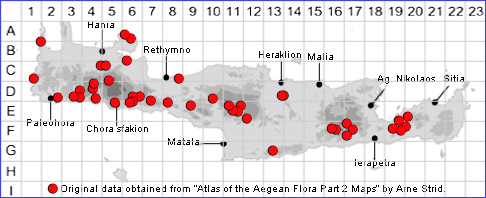ORIGANUM DICTAMNUS
Family and Genus:- See- LABIATAE/Sect. AMARACUS
Common Names:- Cretan dittany
Homotypic Synonyms:- Amaracus dictamnus, Majorana dictamnus,
Origanum saxatile.
Meaning:- Origanum (Gr) Joy-of-the mountain. A name used by the Greek
philosopher Theophrastus for an aromatic herb.
Dictamnus (L) From the Dikti mountains, Crete.
General description:- A densely white-woolly, tufted dwarf shrub.
Stems:-
1) 10-20 cm, slender, long, branched at the base.
Leaves:-
1) 13-25 x 12-25 mm, broadly ovate to orbicular, entire, lanate, the veins raised,
conspicuous.
2) Lower, short-petiolate.
Flowers:-
1) Spicules, in groups of 3-10, dense, ovoid or oblong, arranged in opposite
pedunculate pairs, in lax panicles.
2) Bracts, 7-10 mm, conspicuous, purple, longer than the calyx.
3) Calyx,
a) upper lip, subentire,
b) lower, shallowly toothed.
4) Corolla, pink, the tube twice as long as the calyx-tube.
Fruit:-
1) Nutlets, x 4, seeded.
Key features:-
1) Calyx, 2-lipped. Upper, entire or subentire.
2) Stems, densely leafy above.
3) Leaves, suborbicular, densely and softly white-lanate with branched hairs.
Habitat:- Crevices of vertical limestone cliffs. (50-)200-1300(-1700) m.
Distribution:- Cretan endemic. Widespread but rare.
Flowering time:- (July-)Aug-Sept (-Oct).
Photos by:- Steve Lenton
Status:-
Conservation status (for threatened species): Vulnerable according to the Red
Data Book of Rare and Threatened Plants of Greece (1995).
Vulnerable according to IUCN 1997.
Protection status (for threatened species): Greek Presidential Decree 67/1981.
Bern Convention, EU Dir.1992/43 (Ann.II/IV).
SPECIES DESCRIPTION

